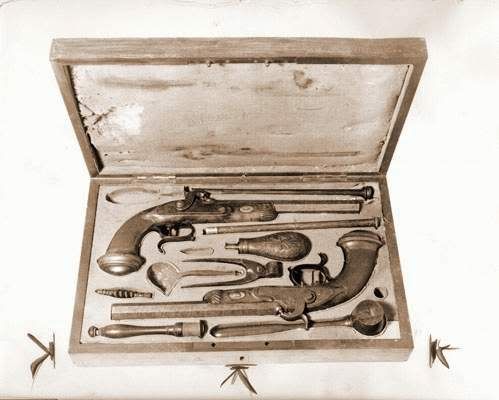A duel.
A good old-fashioned 18th Century Duel!
Pistols.
Smoothbores from a cased set.
Seconds.
They will need Seconds.
Volunteers to be Seconds will be considered.
"Each party would name a trusted representative (a "second") who would, between them, determine a suitable "field of honour". It was also the duty of each party's second to check that the weapons were equal and that the duel was fair. Although generally demanded by custom, similarity of weapons is not essential; neither are witnesses, seconds, etc. In the 16th and early 17th centuries, it was normal practice for the seconds as well as the principals to fight each other. Later the seconds' role became more specific, to make sure the rules were followed and to try to achieve reconciliation,[5] but as late as 1777 the Irish code still allowed the seconds an option to exchange shots."
"Duel
A duel generally signifies an arranged engagement in combat between two individuals, with matched weapons in accordance with agreed-upon rules.
Duels in this form were chiefly practised in Early Modern Europe, with precedents in the medieval code of chivalry, and continued into the modern period (19th to early 20th centuries) especially among military officers. During the 17th and 18th centuries (and earlier), duels were mostly fought with swords (the rapier, later the smallsword, and finally the French foil), but beginning in the late 18th century and during the 19th century, duels were more commonly fought using pistols; fencing and pistol duels continued to co-exist throughout the 19th century. Pistol dueling was employed many times in the Colonial United States until it fell out of favor in Eastern America in the 18th century. It was retained however in the American Old West for quite some time due to the absence of common law.
The duel was based on a code of honour. Duels were fought not so much to kill the opponent as to gain "satisfaction," that is, to restore one's honour by demonstrating a willingness to risk one's life for it, and as such the tradition of duelling was originally reserved for the male members of nobility; however, in the modern era it extended to those of the upper classes generally. From the early 17th century duels were often illegal in Europe."
http://en.wikipedia.org/wiki/Duel


Ten paces, turn and fire?
Last man standing and all that!
How velly, velly BRITISH!
